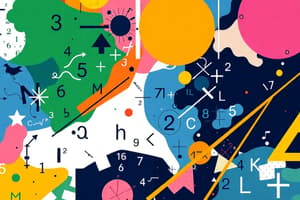Podcast
Questions and Answers
What are the key operations in set theory?
What are the key operations in set theory?
- Union, intersection, complement (correct)
- Contradiction, implication, conclusion
- Sorting, filtering, grouping
- Addition, subtraction, multiplication
Which area of mathematics studies properties of numbers like prime numbers and divisibility?
Which area of mathematics studies properties of numbers like prime numbers and divisibility?
- Geometry
- Algebra
- Trigonometry
- Number theory (correct)
What role does mathematical logic play in mathematics?
What role does mathematical logic play in mathematics?
- It analyzes arguments and derives conclusions. (correct)
- It simplifies arithmetic operations.
- It provides methods for graphical representations.
- It helps in calculating statistical data.
What does a function represent in mathematics?
What does a function represent in mathematics?
Which of these is NOT a key type of function?
Which of these is NOT a key type of function?
What field does mathematics primarily focus on?
What field does mathematics primarily focus on?
What operations are involved in arithmetic?
What operations are involved in arithmetic?
Which property states that changing the order of addition does not change the sum?
Which property states that changing the order of addition does not change the sum?
What is the primary focus of algebra?
What is the primary focus of algebra?
What concept does calculus primarily deal with?
What concept does calculus primarily deal with?
Which of the following is a measure of central tendency in statistics?
Which of the following is a measure of central tendency in statistics?
What is integral calculus primarily concerned with?
What is integral calculus primarily concerned with?
What is a fundamental aspect of geometry?
What is a fundamental aspect of geometry?
Flashcards
Set
Set
A collection of distinct objects. Think of it as a group of things, where each item is unique.
Logic
Logic
The branch of mathematics that deals with reasoning and proof, using symbols to analyze arguments and determine truth.
Function
Function
A relationship between two sets of values, usually input and output. Think of it as a machine that takes something in and produces something out.
Number Theory
Number Theory
Signup and view all the flashcards
Data Analysis
Data Analysis
Signup and view all the flashcards
What is mathematics?
What is mathematics?
Signup and view all the flashcards
What is arithmetic?
What is arithmetic?
Signup and view all the flashcards
What is algebra?
What is algebra?
Signup and view all the flashcards
What is geometry?
What is geometry?
Signup and view all the flashcards
What is calculus?
What is calculus?
Signup and view all the flashcards
What is statistics?
What is statistics?
Signup and view all the flashcards
What are properties of numbers?
What are properties of numbers?
Signup and view all the flashcards
What are different number systems?
What are different number systems?
Signup and view all the flashcards
Study Notes
Fundamental Concepts
- Mathematics is a field of study focused on abstract concepts like quantity, structure, space, and change.
- It uses logic and reasoning to develop general rules applicable to diverse problems.
- Key branches include arithmetic, algebra, geometry, calculus, and statistics.
Arithmetic
- Arithmetic involves basic operations (addition, subtraction, multiplication, division) on numbers.
- It's foundational to more complex mathematical ideas.
- Commutative, associative, and distributive properties are crucial for arithmetic operations.
- Number systems (natural, integers, rational, irrational, real, complex) each have unique properties and applications.
Algebra
- Algebra uses letters or symbols to represent unknown values (variables).
- It introduces equations and inequalities to solve problems with unknowns.
- Fundamental algebraic operations (factoring, expanding, simplifying) are crucial for solving equations.
Geometry
- Geometry explores shapes, sizes, and positions of figures in space.
- Concepts include points, lines, angles, shapes (triangles, circles), and spatial relationships.
- Different shapes have specific properties and calculation formulas.
- Euclidean geometry deals with flat surfaces and their properties.
Calculus
- Calculus focuses on rates of change and accumulation.
- It has two key branches: differential (rates of change) and integral (accumulation).
- Derivatives and integrals are fundamental concepts.
- Calculus finds wide applications in physics, engineering, and economics.
Statistics
- Statistics involves collecting, analyzing, interpreting, presenting, and organizing data.
- Concepts include measures of central tendency (mean, median, mode) and dispersion (variance, standard deviation).
- Probability is also a key statistical concept.
- Statistical methods identify patterns, trends, and relationships in data.
Sets
- A set is a collection of distinct objects.
- Key set operations are union, intersection, and complement.
- Set theory provides a framework for understanding relationships and operations on collections of objects.
Logic
- Mathematical logic studies reasoning and proof principles.
- It uses symbolic representations to analyze arguments and reach conclusions.
- Logical rules and structures are essential for valid mathematical proofs and arguments.
Functions
- A function describes a relationship between two sets of values (input/output).
- Key types (linear, quadratic, exponential, trigonometric) have specific input-output properties.
- Functions represent relationships in many areas.
Number Theory
- Number theory investigates the properties and relationships of numbers.
- Central concepts include prime numbers, divisibility, and modular arithmetic.
- Number theory is important in cryptography and other applications.
Studying That Suits You
Use AI to generate personalized quizzes and flashcards to suit your learning preferences.




